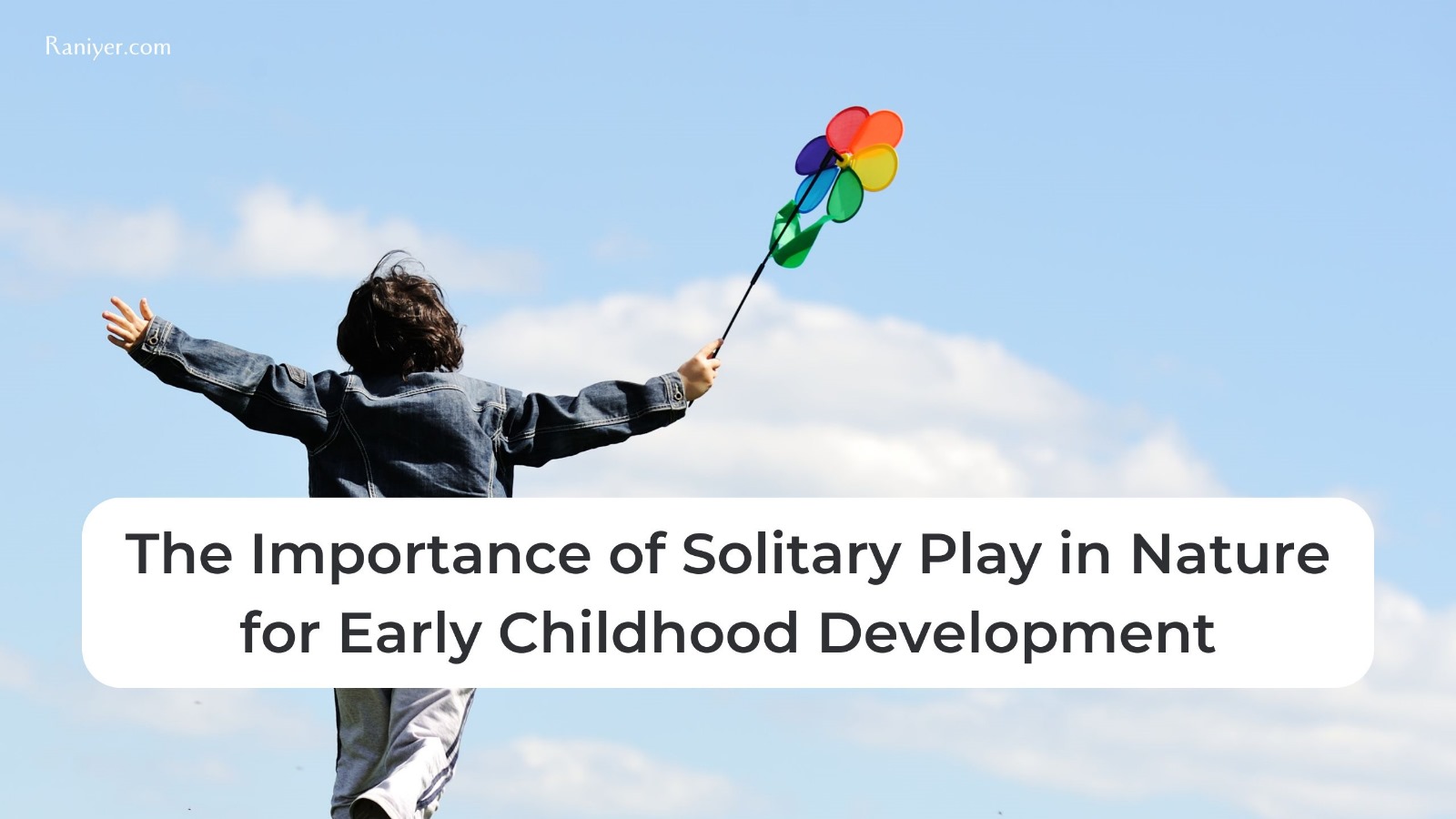In today’s fast-paced and technology-driven world, it is crucial to prioritize the benefits of solitary play in nature for early childhood development. As children grow and discover their surroundings, engaging in unstructured play in natural environments allows them to explore, imagine, and develop a multitude of essential skills.
Solitary play provides a unique opportunity for children to use their imagination, creativity, and problem-solving skills. Away from the distractions of screens or structured activities, they can fully immerse themselves in their own worlds, fostering independence and self-reliance. Whether it’s building forts, collecting rocks, or observing insects, these solitary play experiences connect children to nature, promoting a sense of wonder and appreciation for the environment.
Moreover, studies have shown that solitary play in nature enhances cognitive development, emotional well-being, and physical health. Spending time outdoors engages all the senses, improving focus and attention span, reducing stress, and promoting a healthy lifestyle.
As parents and caregivers, it is vital to recognize and encourage solitary play in nature. By providing opportunities for children to explore and connect with the natural world, we give them the tools they need to develop into well-rounded individuals.
The benefits of solitary play for early childhood development
Solitary play is a crucial aspect of early childhood development, providing children with invaluable opportunities to explore, discover, and grow. When children engage in solitary play, they are able to tap into their innate curiosity, creativity, and problem-solving skills, free from the constraints of structured activities or the influence of peers.
This unstructured play allows children to develop a deeper understanding of themselves, their interests, and their abilities. As they navigate their surroundings and interact with the world around them, they learn to make decisions, overcome challenges, and develop a sense of independence and self-reliance. Solitary play encourages children to be actively engaged in their own learning, fostering a lifelong love of exploration and discovery.
Furthermore, solitary play has been shown to have a positive impact on cognitive development. When children are allowed to play freely, they engage in activities that stimulate their imagination, critical thinking, and problem-solving skills. This type of self-directed play has been linked to improved focus, attention span, and memory, all of which are essential for academic success and lifelong learning. By allowing children to explore their interests and curiosities on their own, we are empowering them to become independent, self-motivated learners.
Playing alone in nature offers numerous developmental benefits for children, fostering independence as they learn to play without constant supervision and self-reliance through creativity, problem-solving, and decision-making. It enhances cognitive health by improving attention span and reducing ADHD symptoms while also supporting emotional growth by building self-confidence and allowing for emotional experimentation and release. Sensory skills are engaged in unique ways that are both calming and invigorating, and the natural environment encourages exploration and a deeper understanding of their surroundings. Additionally, outdoor play facilitates learning fundamental tasks such as fine and gross motor skills, risk-taking, and basic knowledge.
The role of nature in promoting solitary play
The natural world provides an ideal setting for children to engage in solitary play, offering a rich and diverse array of opportunities for exploration and discovery. Outdoor environments, such as parks, forests, and beaches, present children with a wealth of sensory experiences, from the feel of grass beneath their feet to the sounds of rustling leaves and chirping birds.
When children play in nature, they are not only physically active but also mentally engaged, as they navigate their surroundings and interact with the elements around them. The changing seasons, the diverse plant and animal life, and the unpredictable weather patterns all contribute to a constantly evolving landscape that sparks children’s curiosity and imagination.
Moreover, the natural world offers a sense of tranquility and peacefulness that can be difficult to find in more structured or urban settings. By removing the distractions of technology and organized activities, children are able to fully immerse themselves in the present moment, fostering a deeper connection with their environment and a greater appreciation for the natural world. This connection to nature has been shown to have a calming effect on children, reducing stress and promoting overall emotional well-being.
How solitary play in nature enhances cognitive development
Solitary play in nature has a profound impact on children’s cognitive development, helping to cultivate a range of essential skills and abilities. When children are given the freedom to explore and discover the natural world on their own, they engage in a process of active learning that stimulates their senses and challenges their problem-solving skills.
One of the key benefits of solitary play in nature is the development of spatial awareness and problem-solving skills. As children navigate their surroundings, they must constantly assess their environment, identify obstacles, and find creative solutions to overcome them. Whether it’s climbing a tree, building a fort, or navigating a stream, these challenges encourage children to think critically, plan ahead, and adapt to changing circumstances.
Additionally, solitary play in nature has been shown to enhance children’s attention span and focus. The ever-changing natural environment, with its diverse sensory stimuli, helps to capture and hold children’s attention, allowing them to engage in deep, sustained play. This, in turn, supports the development of executive function skills, such as impulse control, working memory, and cognitive flexibility, which are essential for academic success and lifelong learning.
The impact of solitary play in nature on emotional and social development
Solitary play in nature not only benefits children’s cognitive development but also has a profound impact on their emotional and social well-being. By engaging in unstructured play in natural environments, children are able to explore their emotions, develop self-awareness, and cultivate important social skills.
One of the key emotional benefits of solitary play in nature is the reduction of stress and anxiety. The calming, restorative qualities of natural environments have been well-documented, and children who spend time in these settings often exhibit lower levels of cortisol, a hormone associated with stress. This, in turn, supports the development of emotional regulation and resilience, as children learn to manage their feelings and cope with challenging situations.
Furthermore, solitary play in nature fosters the development of self-confidence and self-esteem. As children navigate their surroundings and overcome obstacles on their own, they gain a sense of mastery and accomplishment, which can translate into increased self-assurance and a greater willingness to take risks and explore new challenges. This positive self-image can have a lasting impact on children’s social interactions, as they become more comfortable expressing their thoughts and ideas and engaging with their peers.
Encouraging solitary play in nature: tips for parents and caregivers
As parents and caregivers, it is essential to recognize the importance of solitary play in nature and to actively encourage and facilitate these experiences for young children. By providing opportunities for children to explore the natural world on their own, we can support their holistic development and foster a lifelong appreciation for the environment.
One of the most important steps in encouraging solitary play in nature is to create a safe and stimulating outdoor environment. This may involve setting up a designated play area in the backyard, taking regular trips to local parks or nature preserves, or even incorporating natural elements into the indoor learning space. By ensuring that children have access to a variety of natural materials, such as rocks, sticks, and leaves, we can spark their curiosity and encourage them to engage in self-directed exploration.
Additionally, it is crucial to strike a balance between providing guidance and allowing for independent exploration. While it is important to set boundaries and ensure the safety of the environment, it is equally important to resist the urge to micromanage or direct children’s play. By allowing children the freedom to make their own choices and learn from their experiences, we can foster a sense of autonomy and self-reliance that will serve them well throughout their lives.
Creating safe and stimulating outdoor environments for solitary play
Designing safe and stimulating outdoor environments for solitary play is a crucial step in encouraging children to engage with the natural world. When children have access to well-designed, engaging outdoor spaces, they are more likely to initiate and sustain self-directed play, reaping the cognitive, emotional, and social benefits that come with it.
One key aspect of creating an optimal outdoor environment for solitary play is ensuring the safety and security of the space. This may involve establishing clear boundaries, providing age-appropriate equipment and play structures, and ensuring that the area is free from potential hazards. By addressing safety concerns, parents and caregivers can create a sense of trust and comfort, allowing children to fully immerse themselves in their play without fear of harm.
Beyond safety, it is essential to incorporate a diverse range of natural elements that spark children’s curiosity and imagination. This may include a variety of textures, such as sand, gravel, and mulch, as well as loose parts like sticks, stones, and pinecones that children can manipulate and incorporate into their play. Additionally, incorporating water features, such as a small pond or a sprinkler, can add an element of sensory exploration and discovery. By providing a rich and varied outdoor environment, we can encourage children to engage in open-ended, self-directed play that fosters their overall development.
Incorporating solitary play in nature into early childhood education
The benefits of solitary play in nature extend beyond the home and into the realm of early childhood education. By integrating opportunities for unstructured outdoor exploration into the curriculum, educators can support the holistic development of young learners and foster a lifelong love of learning.
One effective approach to incorporating solitary play in nature into early childhood education is the establishment of “nature-based classrooms.” These specialized learning environments, often located in wooded areas or on expansive school grounds, provide children with ample opportunities to engage in self-directed play and exploration. Within these settings, children can build forts, observe wildlife, and experiment with natural materials, all while developing essential cognitive, social, and emotional skills.
In addition to dedicated nature-based classrooms, educators can also incorporate outdoor learning experiences into their daily routines. This may involve setting aside time for children to engage in solitary play in the schoolyard, taking regular field trips to local parks or nature preserves, or even bringing natural elements, such as leaves, rocks, and sticks, into the indoor classroom. By seamlessly integrating these opportunities for solitary play in nature, educators can ensure that children have the chance to reap the benefits of this crucial aspect of early childhood development.
The potential risks and challenges of solitary play in nature
While the benefits of solitary play in nature are well-documented, it is important to acknowledge the potential risks and challenges that may arise. As parents and caregivers, we must be proactive in addressing these concerns to ensure the safety and well-being of our children.
One of the primary concerns surrounding solitary play in nature is the issue of safety and supervision. Outdoor environments can present a variety of potential hazards, from uneven terrain to the presence of wildlife. To mitigate these risks, it is essential to carefully assess the play area, establish clear boundaries, and provide age-appropriate supervision to ensure that children can explore safely.
Additionally, there may be logistical challenges in providing consistent opportunities for solitary play in nature, particularly for families living in urban or densely populated areas. Access to natural spaces, such as parks or nature preserves, may be limited, and transportation to these locations can be a significant barrier. To address these challenges, parents and caregivers may need to get creative, incorporating natural elements into indoor play spaces or seeking out alternative outdoor venues, such as community gardens or nature-based playgrounds.
Conclusion: The long-term benefits of solitary play in nature for early childhood development
In conclusion, the importance of solitary play in nature for early childhood development cannot be overstated. As children navigate the complexities of the natural world, they engage in a process of active learning that supports their cognitive, emotional, and social development, laying the foundation for lifelong success and well-being.
By providing children with opportunities to explore, discover, and play freely in natural environments, we are empowering them to become independent, self-motivated learners who are equipped to face the challenges of the modern world. Through solitary play in nature, children develop essential skills such as problem-solving, critical thinking, and emotional regulation, which will serve them well throughout their academic and personal lives.
Moreover, the connection to the natural world fostered by solitary play can have a lasting impact on children’s environmental awareness and stewardship. By cultivating a deep appreciation for the natural world from a young age, we are nurturing the next generation of environmental advocates, who will be poised to tackle the complex environmental issues of the future. In the face of the ever-increasing demands of technology and structured activities, it is crucial that we prioritize the role of solitary play in nature for early childhood development. By embracing the countless benefits of this crucial aspect of childhood, we can ensure that our children grow into well-rounded, resilient, and environmentally conscious individuals, ready to navigate the complexities of the world with confidence and success.




